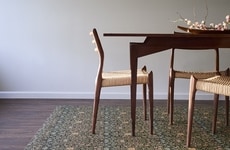
Massimo Copenhagen is a Distinctive Voice in Contemporary Interior Design
Kalin Ned — May 23, 2025 — Art & Design
References: massimo.dk
Massimo Copenhagen effortlessly merges Scandinavian minimalism with artisanal textile traditions. Founded in 2013 by designer Chim Chi and business partner Peter Eland, the brand revitalizes classic weaving techniques through a modern lens, producing rugs that serve as both functional pieces and artistic statements.
Massimo Copenhagen's rugs reflect meticulous craftsmanship, developed through collaborations with skilled weavers in India, Nepal, and Portugal. The designs balance Denmark’s textile legacy with restrained, contemporary aesthetics. Beyond visual appeal, Massimo Copenhagen prioritizes ethical production by utilizing sustainable materials and responsible manufacturing to align with evolving values around conscious consumption.
The modern design brand’s emphasis on artisanal quality and quiet sophistication ensures longevity and a strong heirloom-caliber sensibility for the home goods sector.
Image Credit: Massimo Copenhagen
Massimo Copenhagen's rugs reflect meticulous craftsmanship, developed through collaborations with skilled weavers in India, Nepal, and Portugal. The designs balance Denmark’s textile legacy with restrained, contemporary aesthetics. Beyond visual appeal, Massimo Copenhagen prioritizes ethical production by utilizing sustainable materials and responsible manufacturing to align with evolving values around conscious consumption.
The modern design brand’s emphasis on artisanal quality and quiet sophistication ensures longevity and a strong heirloom-caliber sensibility for the home goods sector.
Image Credit: Massimo Copenhagen
Trend Themes
1. Artisanal-driven Decor - Marrying traditional weaving techniques with modern aesthetics opens innovative avenues for creating high-end, handcrafted home goods that appeal to design-conscious consumers.
2. Minimalist Luxury - Embracing a minimalist yet luxurious approach in home furnishings offers potential for elevated design concepts that cater to consumers seeking understated elegance.
3. Ethical Production Practices - Utilizing sustainable materials and responsible manufacturing processes presents opportunities for brands to distinguish themselves in the increasingly eco-conscious market.
Industry Implications
1. Home Furnishings - Leveraging artisanal craftsmanship within the home furnishings industry provides a unique selling point that can differentiate products in a crowded market.
2. Sustainable Textiles - The industry's shift towards sustainable textiles aligns with growing consumer demand for ethically produced goods, fostering new business opportunities in eco-friendly fabric production.
3. Luxury Interior Design - Incorporating heirloom-quality products into luxury interior design creates an aspirational market niche focused on timeless and sophisticated aesthetics.
4.9
Score
Popularity
Activity
Freshness























